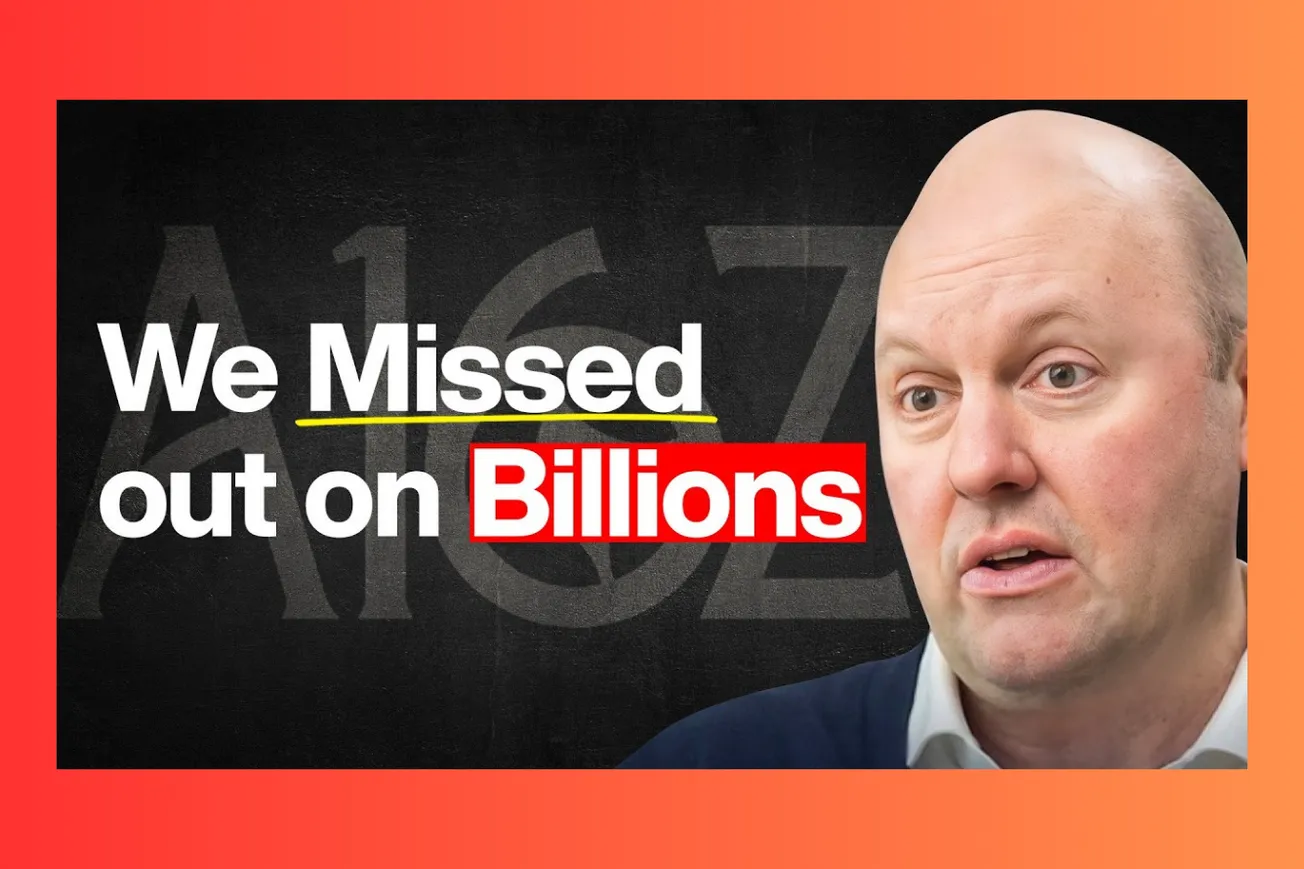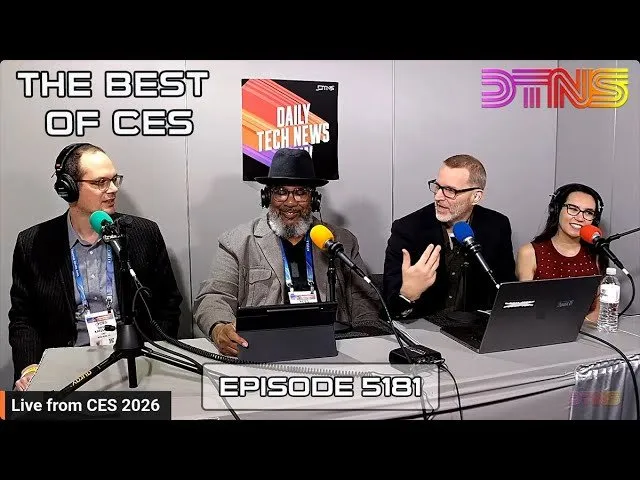Table of Contents
In a rare candid conversation, Marc Andreessen reveals the pivotal moments that shaped Andreessen Horowitz, from launching during the 2008 financial crisis to Facebook's billion-dollar near-acquisition that almost changed tech history forever.
Key Takeaways
- a16z launched in 2009 with just 20 LPs during the depths of the financial crisis, when only two venture funds were raised that entire year
- Facebook nearly sold to Yahoo for $1 billion until the financial crisis caused Yahoo to renegotiate and lower their offer
- The firm evolved from generalist investing to specialized vertical funds as tech companies shifted from building tools to directly disrupting entire industries
- Marc witnessed social media's perception transform from "completely useless" to "mind control device" within just four years of Facebook's IPO
- The "little tech" versus "big tech" distinction became crucial for a16z's policy work, positioning startups as disruptors rather than incumbents
- Silicon Valley's relationship with defense and government work represents a generational shift back to its Cold War roots
- International expansion remains challenging due to regulatory hostility, particularly in Europe where politicians openly prioritize regulation over innovation
- Domain expertise became essential as companies moved beyond simple software tools to full-stack operations across complex industries
The Perfect Storm: Launching a16z During Financial Armageddon
Marc Andreessen and Ben Horowitz picked possibly the worst time in modern history to start a venture capital firm—or maybe it was perfect timing. In March 2009, with the financial world still reeling from the 2008 crisis, they decided to jump into venture capital.
"Ben and I in March of 2009 decided it's perfect time to go start a venture capital firm which was a absolutely unique view at the time," Andreessen recalls. The numbers tell the story: only two venture capital funds were raised in all of 2009. One was a16z, and the other was from legendary investor Vinod Khosla at Kleiner Perkins.
- The first LP meeting happened in 2010 with about 20 limited partners, folding chairs arranged in their small conference room with a flat panel TV on the wall
- Many of those original LPs are still with the firm today, having witnessed its transformation from a scrappy startup to a major force in venture capital
- The timing coincided with a wall of negativity toward tech, where any sign of progress was immediately labeled "bubble 2.0" by the press
- Yahoo's acquisitions of Flickr and Delicious for $25 million each in 2005 were met with media hysteria about crazy valuations
- Social media was widely dismissed as pointless ("What did your cat have for breakfast? Nobody cares") with no viable monetization path
- The prevailing wisdom was that these companies would "never make money," making 2009 an contrarian but opportune moment to invest
The backdrop was brutal. The dot-com crash had taken three to four years to recover from, and just as things started improving around 2003-2004, any tech progress was met with skepticism about another bubble. Then the financial crisis hit, flattening everything.
The Billion-Dollar Facebook Story That Almost Changed Everything
One of the most fascinating near-misses in tech history involves Facebook's almost-acquisition by Yahoo for $1 billion. This wasn't just a rumor—there was an actual deal structure in place that would have completely altered the trajectory of social media.
The context makes the story even more remarkable. Facebook was generating revenue, but it was "remnant ad revenue" from Bing's ad network—essentially the leftover banner ads nobody else wanted. "Facebook literally was selling remnant banner ads from the Bing ad network with these super low CPMs," Andreessen explains.
- Yahoo under Terry Semel correctly identified Facebook as a strategic acquisition target and structured a billion-dollar takeout deal
- The agreement was either signed or verbally committed to when the 2008 financial crisis hit and advertising immediately collapsed
- Yahoo came back trying to renegotiate and lower the price, giving Mark Zuckerberg the opening to walk away from the deal
- At the time, a billion-dollar valuation seemed like a "spectacular home run" for a company started in a dorm just four years earlier
- Internal Yahoo documents later leaked showing they were bullish on Facebook but radically underestimated the company's future growth potential
- Facebook went through another crisis of confidence after going public in 2012 during the desktop-to-mobile transition
What's striking is how the media and investment community completely missed Facebook's potential. Even Yahoo's internal analysis, while positive enough to justify a billion-dollar offer, represented a massive underestimate of what Facebook would become.
The mobile transition created another inflection point. When Facebook went public in 2012, there was widespread belief that mobile would destroy their business model because smaller screens meant fewer pixels to sell ads against. "The stock came out and like tanked right out of the gate," Andreessen remembers. The conventional wisdom was that mobile ad rates would be much lower than desktop rates.
Of course, the opposite happened. Mobile usage increased dramatically throughout the day, and Facebook's treasure trove of personal data made their targeting incredibly effective. But this wasn't obvious to most observers at the time.
The Evolution from "Useless" to "Mind Control": Social Media's Perception Journey
Perhaps no technology has experienced such a dramatic swing in public perception as social media. Andreessen witnessed this transformation firsthand through Facebook's journey, and the speed of change is almost comical in retrospect.
The narrative arc went from complete dismissal to accusations of omnipotent power in just a few years. "It went from 2008 to this is useless to 2012, this is still useless. However, it does get some credit for the Arab Spring and getting Obama elected," Andreessen notes. Headlines at the time proclaimed "social media saves democracy."
- In 2008-2012, social media was viewed as "absolutely useless, has no point, has no purpose" with no viable business model
- By 2012, it received some positive credit for political movements like the Arab Spring and Obama's election success
- By 2016, the narrative completely flipped to portraying social media as an "evil mind-controlling death machine"
- The Russian interference story claimed $80,000 in Facebook ads swung an election where Hillary Clinton spent $3 billion
- Andreessen attended Clinton's Stanford speech where she literally said "Donald Trump is only president today because Vladimir Putin had Facebook"
- The irony is that the supposed "mind control" techniques from Cambridge Analytica aren't used by marketers today, suggesting they never actually worked
The whiplash is remarkable. Within four years, Facebook went from being dismissed as worthless to being accused of possessing near-magical powers of persuasion. As Andreessen puts it: "It went from the ads don't work at all to they are literally mind control."
The logical inconsistencies in this narrative are what made it so surreal for people inside the industry. If Facebook ads were such powerful mind control devices, why weren't toothpaste companies seeing massive returns? Why did the "mind control" only seem to work for political candidates, and why did nobody try to replicate these techniques after 2016?
From Generalist to Specialist: Why Domain Expertise Became Everything
One of a16z's most significant strategic decisions was abandoning the traditional generalist venture model in favor of specialized vertical funds. This wasn't just an organizational change—it reflected a fundamental shift in how the tech industry operates.
The generalist model worked well when the tech industry was primarily building tools: databases, routers, word processors, operating systems. "A database and an operating system are kind of similar," Andreessen explains. "Word processors and video games at the time were both sold for fifty bucks in a box on retail store shelves."
- The pivot point came around 2009-2010 with companies like Uber, Lyft, Airbnb, Tesla, and SpaceX representing "full stack" operations
- These weren't tool companies—they were direct insertions into end markets, requiring deep domain knowledge to evaluate
- The specific problem with generalists is they "can sense heat" but struggle with the details that determine which company will actually win
- In venture capital, if you pick the right space but invest in the wrong company, you can't fix your mistake due to conflict issues
- Understanding deep verticals became essential for identifying the most likely winner in each category
- The firm went through partial verticalization around 2013, then full verticalization by 2017
The stakes of this decision are higher than they might appear. Venture capital has a unique constraint: if you invest in one company in a space, you typically can't invest in competitors. This means getting the specific company selection right is crucial, not just picking the right market.
"What we realized was the thing that was becoming very important in this new world was understanding deep in the vertical what was going on specifically for the purpose of being able to tell which company was actually the one that was most likely to win," Andreessen explains.
This shift also reflected a broader change in the tech industry. Companies were no longer just building software tools that could be evaluated with similar criteria. They were building complex operations that required understanding of logistics, regulations, physical infrastructure, and industry-specific dynamics.
The "Little Tech" Revolution: Reframing the Startup Narrative
One of a16z's most important political innovations was creating a clear distinction between "little tech" (startups) and "big tech" (incumbents). This wasn't just semantic positioning—it fundamentally changed how policymakers viewed the startup ecosystem.
The problem was that when a16z first started engaging with policymakers, "they were just like well tech is tech." Andreessen would show up to advocate for startups and get yelled at about Google's policies. The conflation was damaging because it positioned all technology companies as a monolithic bloc.
- Big tech companies have thousands of lawyers, policy people, and compliance staff to handle their own advocacy
- Most venture-backed startups are actually trying to disrupt big tech incumbents, not support them
- The venture ecosystem serves as an "escape hatch" for frustrated big tech employees who want to compete with their former employers
- Big tech companies often have a "love-hate relationship" with venture capital because VCs fund their potential competitors
- The "little tech" framing immediately changed the dynamic in Washington, where both parties agree on hating big tech
- The agenda focuses on "freedom to innovate" rather than opposing all regulation
The strategic brilliance of this positioning becomes clear when you consider the political dynamics. Both Democrats and Republicans are skeptical of big tech, but for different reasons. By clearly separating venture-backed startups from incumbents, a16z could build bipartisan support for policies that enable innovation without defending controversial big tech practices.
"The minute we say we're not here on behalf of big tech, we're on behalf of little tech, and in fact, our companies attack big tech, we get like these huge smiles," Andreessen notes. Suddenly, tech startups became the good guys—the David taking on Goliath.
This isn't just political positioning; it reflects an underlying economic reality. Most successful venture-backed companies do end up competing with established tech giants in some way. The venture ecosystem is inherently disruptive to existing players.
The Generational Defense Tech Divide: From Vietnam to Ukraine
Perhaps no topic reveals the generational and cultural shifts in Silicon Valley more clearly than the debate over working with defense and intelligence agencies. Andreessen traces this back to a fundamental disruption in the 1960s that shaped attitudes for decades.
Silicon Valley's relationship with defense goes back to the 1920s, when the region was building radar and missile guidance systems. This continued through the Cold War, when industry-government collaboration was seen as essential for competing with the Soviet Union. Then Vietnam changed everything.
- Stanford Research Institute (SRI) was spun off from Stanford because of protests against military research
- MIT had similar splits with projects like Lincoln Lab
- The anti-war movement created a culture where working with the government was seen as morally compromised
- Universities banned ROTC recruiting, and companies disengaged from defense contracts
- This "groove shift" (Andreessen's term for a 1960s vibe shift) lasted for decades
The irony is that Andreessen's company Netscape was always active with defense and intelligence agencies, but this was unusual for the era. Most Silicon Valley companies avoided government work entirely.
- The new generation, led by Alex Karp at Palantir and Palmer Luckey at Anduril, has completely flipped this dynamic
- The attitude shifted from moral opposition to pragmatic engagement: customers are customers, and national missions matter
- The Ukraine battlefield demonstrates that every aspect of modern geopolitics has major tech components
- Most people throughout history have considered borders "an important and valid thing"
- The question becomes whether the world is safer with a strong US military versus weak
This represents a profound cultural shift that goes beyond specific companies or contracts. It's about whether the tech industry sees itself as separate from or integrated with broader national interests.
The Paul Graham-Palantir Twitter dispute that Andreessen references crystallizes this generational divide. Graham represents the post-Vietnam era assumption that of course you don't work with controversial government agencies. The newer generation sees this as naive given the tech components of modern national security challenges.
Global Expansion in a Hostile Regulatory Environment
Despite a16z's success in the US market, international expansion remains challenging due to what Andreessen describes as "incredible drag by bad governments and bad policies." The firm's approach to international markets reflects both opportunities and constraints.
The opportunities are significant. "Every kid anywhere in the world now can watch Peter Thiel talks and our podcast and everything else," creating global enthusiasm for entrepreneurship. There's human capital everywhere, and Andreessen believes historians will look back at our failure to utilize global talent as primitive.
- Europe persistently "shoots itself in the foot" with regulations designed to kill tech innovation
- A senior European politician was quoted saying: "We know we cannot be the global leader in tech innovation so therefore we will be the global leader in tech regulation"
- This drives talented European founders to apply for US visas as quickly as possible
- The UK showed promise under previous governments but failed to follow through on liberalizing crypto or AI policies
- Defense spending increases in Europe raise questions about whether they'll buy from US or only indigenous vendors
The firm focuses on three types of international activities: business development to help portfolio companies succeed globally, investing in international companies (though many founders end up moving to the US anyway), and potentially engaging in international policy work.
The regulatory hostility is particularly striking in Europe, where officials seem proud of their anti-innovation stance. This creates a brain drain where the most talented people leave for more supportive environments, primarily benefiting the US ecosystem.
From an investment perspective, a16z has been "open to investing in many places in the world" outside of China, with recent investments in France and other international markets. However, the practical reality is that many of the best global founders end up moving to the US anyway.
The policy dimension remains underdeveloped but could become important. If regulatory environments continue diverging globally, venture firms may need to engage more actively in international policy discussions to protect their portfolio companies and the broader innovation ecosystem.
Looking back at these stories, you can see how venture capital success often comes down to being contrarian at exactly the right moments. Whether it's launching a fund during a financial crisis, supporting a social network when everyone thinks it's useless, or working with the government when the industry culture opposes it—the biggest wins come from seeing opportunities that others miss or avoid entirely.





